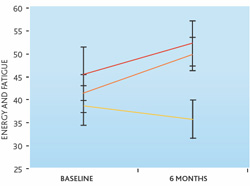Complementary Center Without Walls

The Oregon Center for Complementary and Alternative Medicine in Neurological Disorders has been funded since 1999, through the National Center for Complementary and Integrative Health (NCCIH), part of the National Institutes of Health. Initial studies examined treatment using botanicals, yoga, chiropractic manipulation and acupuncture as well as more basic science studies.
Collaboration and natural antioxidants
The center initiated formal collaborations between OHSU and neighboring institutions: three CAM institutions – the National University of Natural Medicine, University of Western States, the Oregon College of Oriental Medicine; the Linus Pauling Institute at Oregon State University; and the Portland Veteran Affairs Medical Center. One set of animal studies led by Dennis Bourdette, M.D., explored natural antioxidants in a mouse model of multiple sclerosis and found alpha lipoic acid significantly attenuated clinical signs and central nervous system inflammation in this model. Studies have teased apart the mechanism of this benefit of alpha lipoic acid (Maracci et al, 2002, Salinthone et al, 2008) and human trials have begun.
Age-related cerebral degeneration
Joseph Quinn, M.D., and Balz Frei, Ph.D. led another project investigating mouse models of age-related cerebral degeneration, focusing on amyloid mouse models of Alzheimer’s disease. Initial results observed that ginkgo biloba extract and lipoic acid both improved the behavioral function of amyloid transgenic mice but that both produced no effect on the amyloid deposits in the brain (Stackman et al, 2003, Quinn et al, 2007). Follow-up studies extended the work to many other dietary supplements including coenzyme Q, fish oil, and docosahexaenoic acid. Jeffrey Kaye, M.D., led the first moderate-sized (133 subjects) primary prevention of dementia study in healthy over-84 year olds. Subjects who took ginkgo biloba extract for four years had a lower incidence of cognitive decline but the common intention to treat statistical analysis of all subjects fell just short of the common cutoff for significance, with a p value of 0.06. (Dodge et al, 2008).
Yoga trial

Barry Oken, M.D., Ph.D., led a project that included one of the earliest reasonably-sized, well-controlled trials of yoga in a clinical population. One study focused on those with Multiple Sclerosis and found that those randomized to six months of a yoga class or to an exercise class had significantly less fatigue than those randomized to a wait-list control group (Oken et al, 2004, see figure to right). Fatigue is a significant problem for those with Multiple Sclerosis and this important finding has been incorporated into standard clinical care. Another study with similar interventions in a group of healthy 65–85 year-olds, also found that those randomized to yoga had significantly less fatigue (Oken et al, 2006). Both studies found no clear effects on cognitive function.
The follow-up NIH-funded center grant to the original ORCCAMIND grant focused on mind-body medicine with an emphasis on expectancy and placebo effects, again with both animal and human projects. One project developed an animal model of a conditioned therapeutic response that had many features of a placebo effect (Jones et al, 2008). One project demonstrated the cognitive improvement in healthy seniors from simply the expectancy effect of taking a cognitive-enhancing agent (Oken et al, 2008). The two other projects examined the expectancy effect in humans with Parkinson’s disease and with metabolic syndrome. The expectancy or placebo effect, which is mediated through the brain and its connections, needs to be better understood in order to improve clinical research design and also to develop methods to clinically utilize the benefit of this mind-body effect (Oken, 2008).
Current ORCCAMIND research
Current research affiliated with the ORCCAMIND program include the BENFRA Botanical Dietary Supplements Research Center at OHSU, https://www.ohsu.edu/benfra-bdsrc, and research performed as part of the T32 institutional training grant, https://www.ohsu.edu/orccamind/orccamind-academics-and-training on "CAM Research Training in Neuroscience and Stress", both of which are funded by the NCCIH.
ORCCAMIND has a major interest in collaboration with the Portland area CAM institutions mentioned above. This collaboration has been highlighted by the two NIH-funded center grants that included project leaders and pilot grants at each of the three CAM institutions and has been extended to facilitation of faculty appointments and research interactions with OHSU faculty. ORCCAMIND supported research has extended to acupuncture and oriental medicine, naturopathy (Shinto et al, 2008a), and chiropractic (Haas et al, 2004). This collaboration with the CAM institutions extends to an annual invited CAM Distinguished Lectureship (sponsored by the Oregon Collaboration for Integrative Medicine), an annual Symposium for Portland-Area Research on Complementary and Alternative Medicine (SPARC), and the NIH research education grants awarded to the three Portland CAM institutions.
Training academicians
ORCCAMIND has always had a major emphasis on training academicians. The original ORCCAMIND centre grant provided four career development awards. Two awardees with clinical doctorates went on to obtain their own five-year NIH career development grants as a result. One of these clinicians, Lynne Shinto, ND, MPH, also began a Wellness Clinic within the Department of Neurology. Dr. Oken is principal investigator of an NIH-funded institutional training grant, “CAM Research Training in Neuroscience and Stress” that has been funded since 2005. There have been forty four post-doctoral fellows and one pre-doctoral fellow based at either OHSU (Departments of Neurology, Behavioral Neuroscience, or Psychiatry) or the Linus Pauling Institute at Oregon State University. Research by these fellows has extended from basic science to health services research. ORCCAMIND works closely with the OHSU Human Investigation Program, a certificate or masters degree program to educate clinical researchers beginning their post-doctoral careers. Dr. Oken received funding for his own five-year NIH career development award that further enhanced his mentorship of junior academicians as well as advance his ability to utilize advanced signal analysis to improve mind-body medicine research.
In 2020, the T32 received a supplement to create a class available to all OHSU postdocs entitled, “Biomarkers of Psychological Stress” (HIP 536). The course began in the Spring of 2021 and discusses how to incorporate physiological biomarkers of psychological stress into clinical trials. Learn more about our training and academics
References
Bowman GL, Frei B, Calabrese C, Dodge HH, Oken BS, Kaye JA, Quinn JF. Ascorbic acid and rates of cognitive decline in Alzheimer’s disease. Journal of Alzheimer’s Disease 2009, 16:93-98.
Calabrese C, Gregory WL, Leo M, Kraemer D, Groves M, Bone K, Oken B. Effects of a Standardised Bacopa monnieri Extract a on Cognitive Performance, Anxiety and Depression in the Elderly: A randomised Double-blind Placebo Controlled Trial. Journal of Alternative and Complementary Medicine 2008, 14:707-713.
Dodge HH, Zitzelberger T, Oken BS, Howieson D, Kaye J. A randomised placebo-controlled trial of ginkgo biloba for the prevention of cognitive decline. Neurology 2008, 70:1809-1817.
Ellingson RM, Eriksen KJ, Schaller JJ, Zajdel D, Kudura A, Oken B. Second generation complementary and alternative medicine physiologic data collection and monitoring research platform. Conference Proceedings IEEE Engineering in Medicine and Biology Society 2008, paper ThDPo07.1.
Fonareva I, Zajdel D, Herting M, McGee W, Oken B. Cognitive processes in older adults: potential impact of stress and physiologic function. Cognitive Neuroscience Society annual meeting, San Francisco 2009.
Haas M, Groupp E, Kraemer DF. Dose-response for chiropractic care of chronic low back pain. The Spine Journal 2004, 4:574–583.
Jones RE, Moes N, Zwickey H, Cunningham CL, Gregory WL, Oken B. Treatment of experimental autoimmune encephalomyelitis with alpha lipoic acid and associative conditioning. Brain, Behavior and Immunity 2008, 22:538-43.
Kaye JA, Dodge H, Zitzelberger T, Moore M, Oken B. MRI evidence for a disease modifying effect of Ginkgo Biloba extract in a dementia prevention trial. International Conference on Alzheimer’s disease. 2008. Presentation number IC-02-01.
Lovera J, Bagert B, Smoot K, Morris CD, Frank R, Bogardus K, Wild K, Oken B, Whitham R, Bourdette D. Ginkgo for improvement of cognitive performance in multiple sclerosis: a randomised, placebo-controlled trial. Multiple Sclerosis 2007. 13:376-385.
Marracci GH. Jones RE. McKeon GP. Bourdette DN. Alpha lipoic acid inhibits T cell migration into the spinal cord and suppresses and treats experimental autoimmune encephalomyelitis. Journal of Neuroimmunology 2002, 131:104-14.
Oken BS, Kishiyama S, Zajdel D, Bourdette D, Carlsen J, Haas M, Hugos C, Kraemer DF, Lawrence J, Mass M. randomised controlled trial of yoga and exercise in multiple sclerosis. Neurology 2004; 62:2058-2064Oken, BS, Zajdel D, Kishiyama S, Flegal K, Dehen C, Haas M, Kraemer DF, Lawrence J, Leyva J. randomised controlled 6-month trial of yoga in healthy seniors: effects on cognition and quality of life. Alternative Therapies in Health and Medicine 2006, 12:40-49.
Oken BS, Flegal K, Zajdel D, Kishiyama S, Haas M, Peters D. Expectancy effect: impact of pill administration on cognitive performance in healthy seniors. Journal of Clinical and Experimental Neuropsychology 2008, 30:7-17.Oken BS. Placebo effects: Clinical aspects and neurobiology, Brain 2008, 131:2812-2823